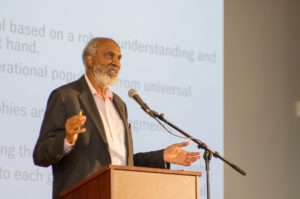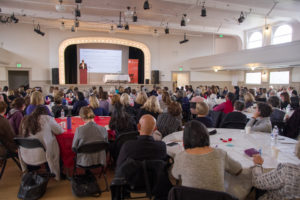This year marked the third time Washington Women’s Foundation hosted a full-day conference, Intersect: Join the Conversation. Our conference theme was justice-driven philanthropy, and it was inspired by the following quote from an article by Dorian O. Burton and Brian C.B. Barnes in the Stanford Social Innovation Review:
“Ultimately, real change will come only when all organizations and individuals in a system change. But systemic change does not come without expense. Time, resources, reputation, and relationships all require adjustments and sacrifice as we move from charitable giving to a justice-based framework of philanthropy. The question becomes: Are we as philanthropists, in the name of justice, willing to pay the cost for the change we wish to see? Our actions moving forward will reveal our answer. Charity is commendable, but justice is transformational.”
Since our founding, Washington Women’s Foundation has sought to influence community transformation. As our founding President, Colleen Willoughby often said, “Charity fills a need. Philanthropy makes change happen.” But what “change,” what “transformation” is philanthropy seeking?
In 2018, Washington Women’s Foundation decided that the change we wanted to see was a more equitable world, a world where a person’s identity, and specifically a person’s race and/or gender identity, no longer predicted how that person fared in life. We also wanted to support organizations working to reduce disparities among people and communities, especially in situations where life experiences, life outcomes, and the distributions of society’s benefits and burdens were being dictated by a person’s race, gender identity, or other characteristics historically linked to discrimination or exclusion.
We acknowledge, as noted by the authors quoted above, that often equity requires that systems be changed, because systems, institutions and structures cause disparate outcomes. However, before engaging in grantmaking directly focused on systems change, we have organized much of the Foundation’s educational offerings over the past year and a half around understanding systems and the levers of systems change.
Intersect 2019 continued this learning, and we were so fortunate to have as one of our instructors this year, john a. powell, an internationally recognized expert in the areas of civil rights, civil liberties, structural racism, housing, poverty, and democracy. He also is the Director of the Othering & Belonging Institute (formerly known as The Haas Institute for a Fair and Inclusive Society) at the University of California, Berkeley.

From the outset, Dr. powell challenged our focus on reducing disparities as being the wrong goal. He illustrated his point as follows: The differences between the suicide rates of white men versus black men have decreased in recent years but only because white men are now committing suicide more frequently than in the past. In this example, the disparity has been reduced, but we are even farther from the ultimate goal of reducing suicide rates among all men.
Dr. powell’s work to advance equity is based upon the concept of “targeted universalism,” which seeks to get everyone to a universal goal, not just the most marginalized people. However, targeted universalism also recognizes that different groups need different things to get to the goal and often, systems are creating or reinforcing obstacles to reaching the goal. Dr. powell specifically pointed out that structures can limit or enhance opportunity, including the opportunity to access education, transportation, food, housing, justice, and health care. Structures also can limit, or enhance, an individual’s economic opportunities as well as determine how much, or how little, any group is impacted by climate change. Two panels later in the day at Intersect, one focusing on economic justice and one on climate justice, illustrated how those structural impacts are affecting different communities and groups of individuals across Washington state.
Dr. powell noted that equity efforts can be directed towards transactional change and transformative change, and while both are sometimes needed, we should not confuse the two. He explained:
- Transactional Change: A change within existing structures.
- Transformational Change: A change to existing structures.
Dr. powell observed that philanthropy has focused primarily on transactional changes, trying to “fix the person,” not fix the structures. Again, by way of illustration, he shared his own experience as a very tall man, who doesn’t easily fit into compact rental cars. In his example, philanthropy would define the “problem” as his being too tall rather than seeking to address the limitations of the structure – the compact car – that he is trying to operate in.
He also noted that systems and structures can create a complex web that may require multiple solutions or interventions to change outcomes. The gender pay gap was his illustration. Even if women receive the same pay as men, they still may have different economic outcomes due to other gender disparities, such as the inequitable division of labor in the home, limited extent of education, liberties (or lack thereof) based upon social norms, and even consumer pricing.

Dr. powell also addressed what he describes as “othering,” a set of common processes that engender marginality and persistent inequity across a full range of human differences. Othering, as explained by Dr. powell, is the failure to recognize someone’s full humanity at the conscious, unconscious or structural level. Structural inequity and othering is created by different groups and people having different pathways with structural road blocks to reach a common goal.
The opposite of othering is not “same-ing” but belonging, which Dr. powell emphasized includes the power to co-create systems and structures. So, if you are seeking transformational change, then it is imperative that the people most impacted by the systems and structures have the power to co-create new systems and structures.
If these individuals do not currently have the power to co-create, then Professor powell observed that they can gain power through linking social networks and creating social capital. That is exactly what our founders did when they created Washington Women’s Foundation – they envisioned increased power of a collective group of women philanthropists moving their money together. However, we can’t stop here – Washington Women’s Foundation needs to continue building linkages and bridges among networks and individuals.
Dr. powell’s presentation reinforces the importance of our examining and understanding our own power as a philanthropic collective so that we can build relationships and share power to make truly transformational changes, to co-create with our community new structures that work for everyone. Our vision is a community where everyone belongs and no one is othered, and philanthropy is a bridge between individuals. As Dr. powell said, I am looking toward a future that is not yours or mine, but ours.
Thank you for distilling this so beautifully Beth!
Thank you for a great summary of a great day. Congratulations to WWF for highlighting a critical issue of our time, and thanks to Patricia Keegan and all the other members who made it happen.
This is an excellent summary and forward looking perspective on what we heard at Intersect.
The program was exceptional and I am glad I was able to attend.
I enjoyed attending Intersect this year and appreciate your bringing Professor powell and his insights to our region. His definition that the opposite of othering is not saming is priceless. If we all understood and applied that in our daily lives, we’d be on the journey to equity.